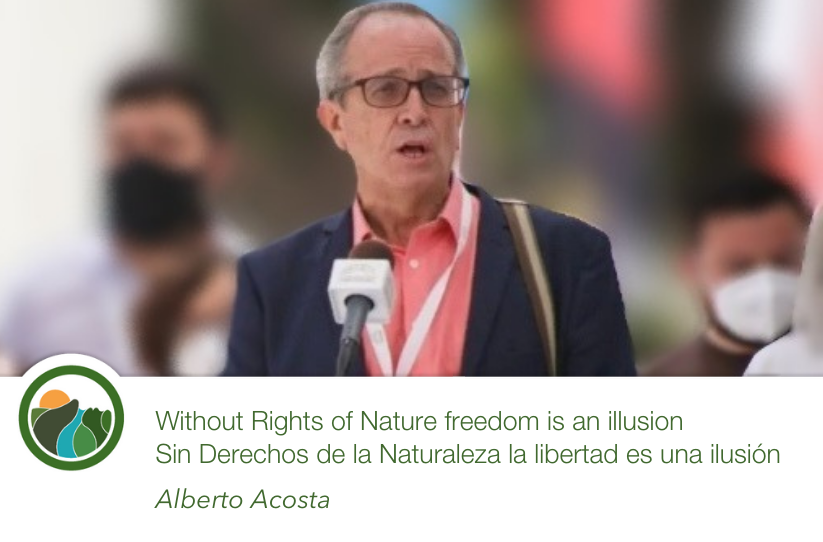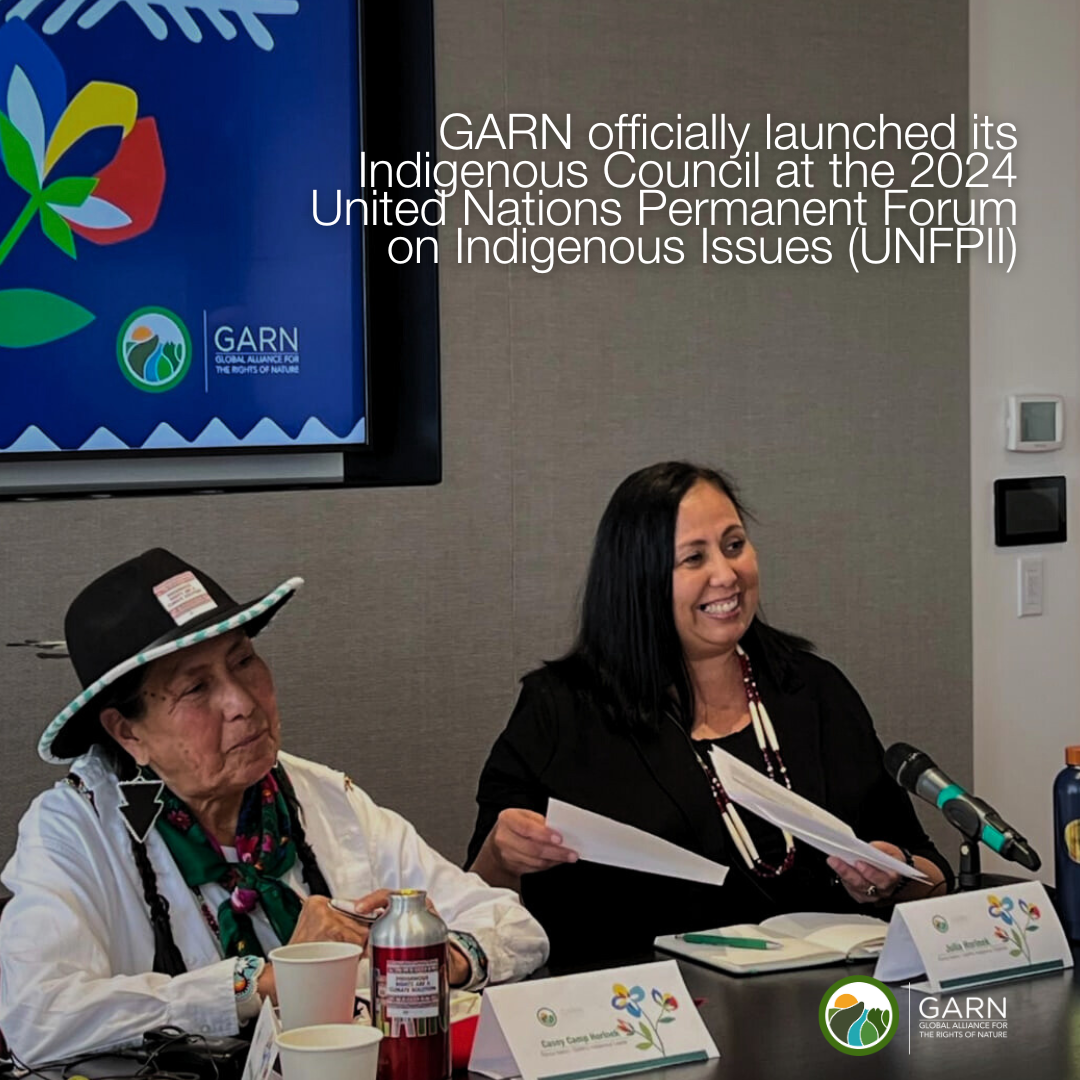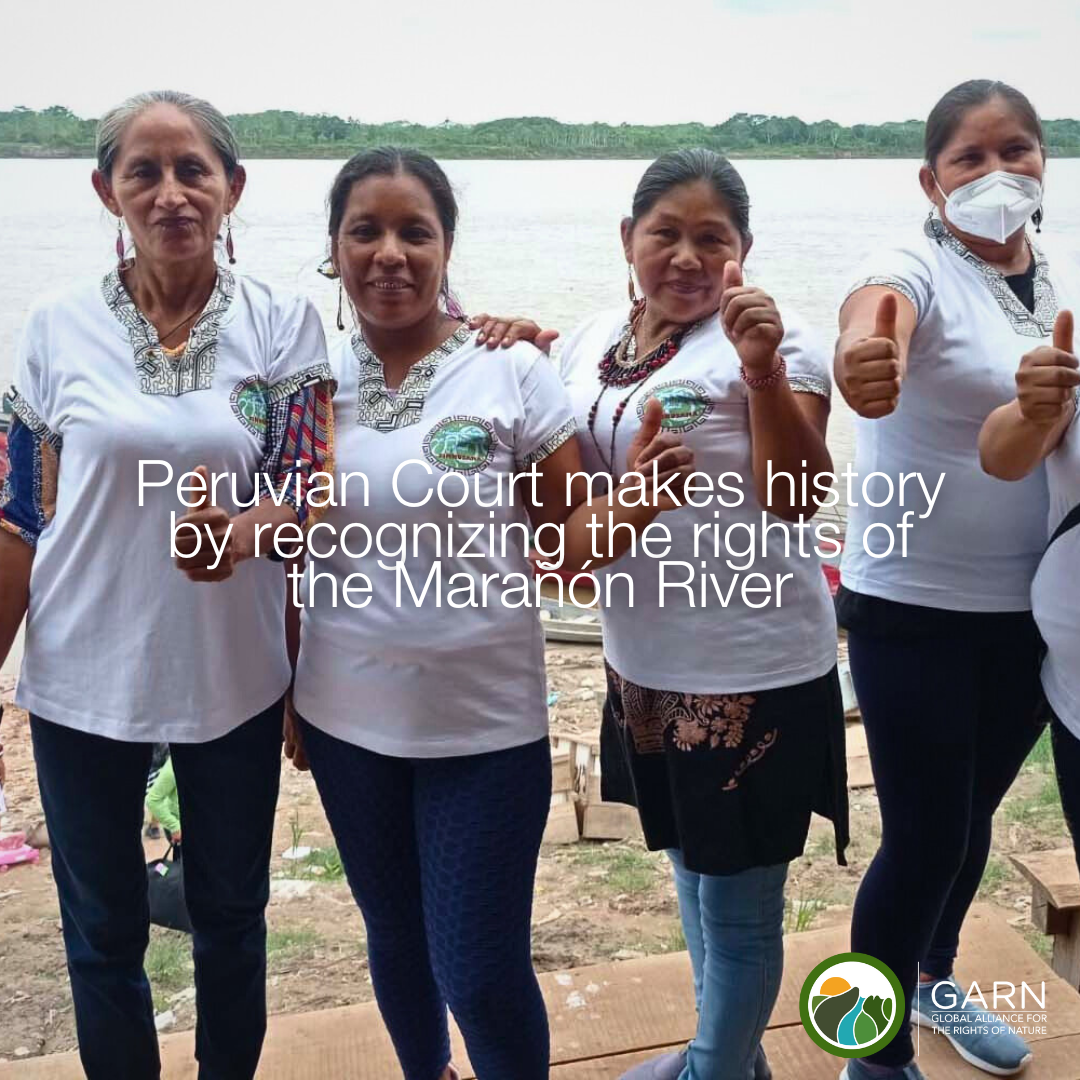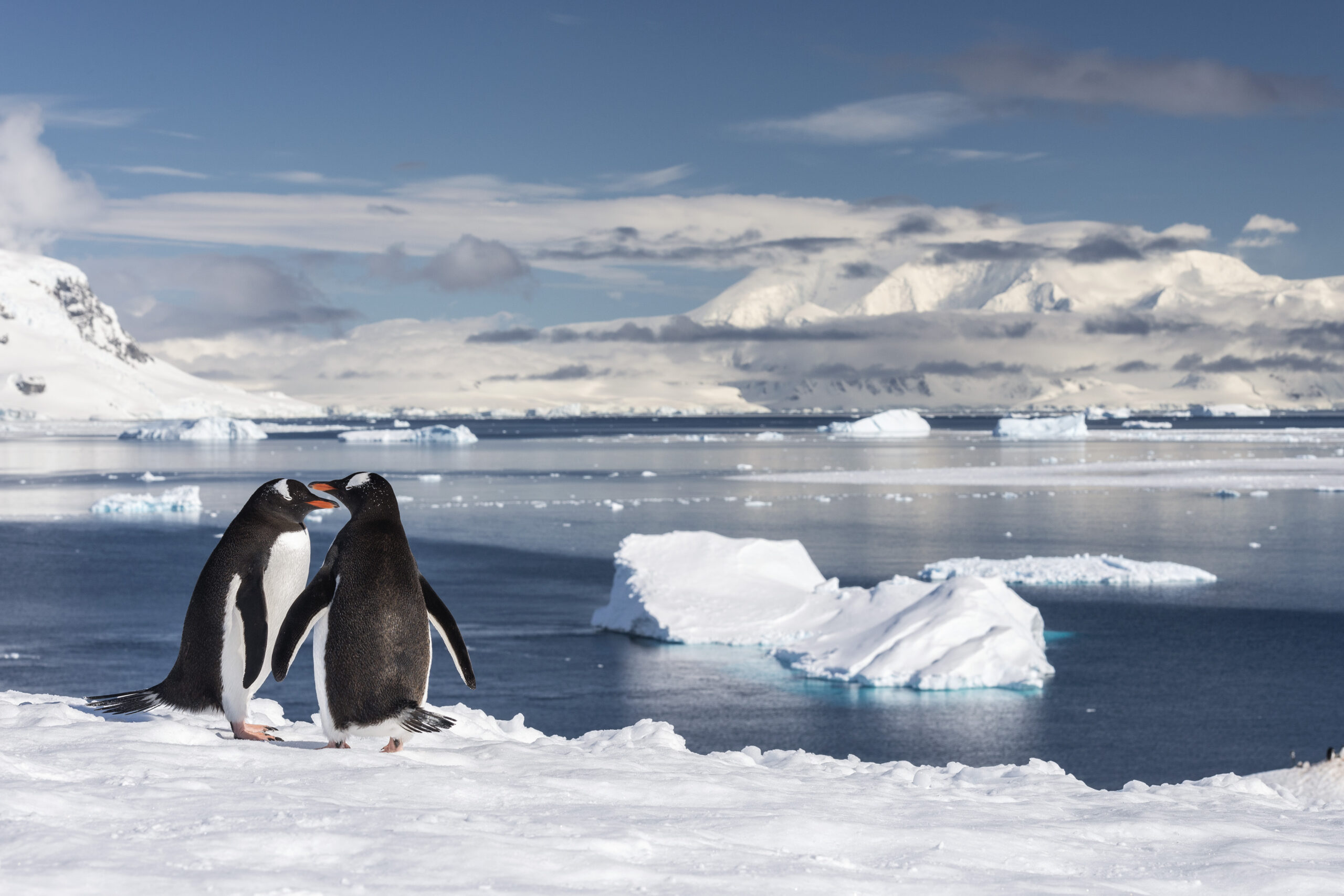Without Rights of Nature freedom is an illusion
Alberto Acosta[1]
Santiago de Chile, March 7, 2022
“The full incorporation of nature into the Law as a subject will undoubtedly be achieved only gradually, without a doubt, only gradually; for the time being, it is enough to establish it as a goal that will point out the course we must follow.”
Godofredo Stutzin (1984)
Chilean ecologist [1917-2010].
The first texts proposed on the Rights of Nature in the Chilean Constitutional Convention were not approved. There are several reasons and even the reasons for this rejection. What counts, without going into further analysis, is that the debate has been raised and that history is repeating itself. Let us remember that the emancipation of slaves or the extension of full rights to indigenous peoples, women, and children were rejected at the time as absurd. It would be enough to remember that, when the slaves were “freed” in several countries of our America, there were many who complained about the “losses” suffered by their “owners”, whose “freedom” was restricted in order to commercialize, use and exploit them…
These rights, approved for the first and, for the time being, only time in the Constitution of Ecuador in 2008, have been reached from several spheres. In the Ecuadorian case, the Rights of Nature are inscribed as part of an emancipating miscegenation that provoked a “juridical hybrid”, where elements of all those indigenous cultures – and also some “western” ones – related to life are recovered, who understand with good reason that Mother Earth or Pachamama, as a territorial, cultural and spiritual space, cannot be a reason for commercialization or exclusion.
Simultaneously, the Constituent Assembly of Ecuador was influenced by all the struggles of diverse groups of society that defended nature. This was a moment of great creation that was inserted in the process of emancipation of humanity, which permanently claims the right to have rights.
When we speak of the Rights of Nature, it should be emphasized that the focus is on nature, which obviously includes the human being. Nature is worth by itself, regardless of the uses given to it by humans, implying a biocentric vision. These rights do not defend an untouched nature that leads, for example, to stop growing crops, fishing, or livestock. What is defended is the maintenance of systems and sets of life. Their attention is focused on ecosystems, on collectivities, not on individuals, without tolerating in any case the torture of any living being. You can eat meat, fish, and grains, for example, as long as you ensure that ecosystems remain functioning with their native species.
But we must go further. It is not a matter of seeking a balance between economy, society, and ecology, which is impossible using capital as a hidden articulating axis. Human beings and their needs must always take precedence – even more so over capital – but never in opposition to the harmony of nature, the fundamental basis for any existence. And this discussion has a history.
There is a long list of those who have tried, for centuries, to understand and recompose the relationship of human beings with nature, and who have proposed a radical turn to the vision of their domination of Mother Earth by human beings.
There are sustainable visions and practices that are lost in time. They are not found in the archives of modernity. Here we find many indigenous communities -bearers of a long memory- that have demonstrated throughout the world that human beings can organize sustainable ways of life. Their link with Pachamama or Mother Earth is more than a metaphor. But there are other entries, also potent.
The vigorous thought of Baruch Spinoza (1632-1677), a Sephardic Jew of Spanish origin, is key in this regard. When he wrote Deus sive natura, he understood that God is nature, he spoke of an active nature: natura naturans, that is, literally of a “nature naturanda”; nature – for him – was neither passive nor created, that is, it was not a question of a “nature naturada”. His thinking influenced many other people and processes, such as Hans-Carl von Carlowitz, who first coined the term “sustainability” in 1713; or later the great researcher Alexander von Humboldt. And along these lines, from scientific reflections, we could mention James Lovelock and Lynn Margulis, as well as Elizabet Sahtouris and José Lutzenberger, among many others, who characterized the Earth as a super living organism that deserves respect and care in the seventies of the 20th century: that is why it was called Gaia, a name from Greek mythology to define the vitality of the Earth itself. We could also remember some thinkers who, with different approaches, contributed to make humanity aware that the Earth is one -before we have the first photographs of the Earth taken from space-, such as Nicolaus Copernicus, Nikolaus von Kues, or Nicholas of Cusa (Cusanus), Johannes Kepler, John Evelyn, Carl Nilsson Linnæus, Johann Wolfgang von Goethe…
Somewhat closer in time, it is appropriate to mention the valuable contribution of the jurist Christopher Stone: Should Trees Have Standing? (1972), considered by Jörg Leimbacher as the “father of the Rights of Nature”. We should also note the recent legal contributions from Latin America by Raúl Eugenio Zaffaroni, Ramiro Ávila Santamaría, and Agustin Grijalva, and from Africa by the South African jurist Cormac Cullinan, to mention just a few examples of a list that is growing rapidly. Nor can we forget the great contributions of Vandana Shiva or Yayo Herrero, to mention a couple of other names. Here we could also mention the equally valuable contributions of Albert Schweitzer, Godofredo Stutzin, Aldo Leopold, Peter Saladin, Jörg Leimbacher….
As Leonardo Boff emphasizes, in these visions it is possible to recognize the transversal inter-retro-connections between all beings: everything has to do with everything, at all points, and in all circumstances; this is the relationality of the indigenous world, also recognized in the encyclical Laudato si’, which has Francis of Assisi as its germinal seed.
Even in the literary field, there are relevant contributions. An example: Italo Calvino in the twentieth century, in his novel The Baron Rampant (1957), tells how Cosimo Piovasco de Rondo, decides to spend his whole life perched in the trees. And from there he proposes the Rights of Nature for a new Constitution, in this novel set during the French Revolution.
In the midst of the current climatic and ecological collapse, it is high time to understand nature as a basic condition of our existence and, therefore, also as the basis for collective and individual rights of freedom. Just as individual freedom can only be exercised within the framework of the same rights of other human beings, individual and collective freedom can only be exercised within the framework of the Rights of Nature. German professor Klaus Bosselmann categorically concludes: “Without the rights of nature, freedom is an illusion“.
In legal practice, this means that from now on there is no longer any right to exploit nature, let alone to destroy it, but only a right to ecologically sustainable use. Human laws, then, must be in accordance with the laws of nature. And, furthermore, let us keep in mind that, in reality, nature is what gives us human beings the right to exist, and that it, in its permanent search for equilibrium, does not make mistakes…
Understanding this point demands a Copernican turn in the legal, economic, social, and political spheres. The right to have rights always demands a political effort to change those norms that deny those rights and to confront the power groups that seek to protect their privileges based on the exploitation of humans and nature. The struggle continues. We continue to advance with the confidence that Chile will consolidate this emancipatory process.
[1] Ecuadorian economist. Partner in the struggles of social movements. University professor. Minister of Energy and Mines (2007). President of the Constitutional Assembly (2007-2008). Author of several books.
Sin los Derechos de la Naturaleza la libertad es una ilusión
Alberto Acosta[1]
Santiago de Chile, 7 de marzo del 2022
“La plena incorporación de la naturaleza al Derecho en calidad de sujeto se logrará, sin duda, sólo en forma paulatina; por de pronto, basta con establecerla como una meta que ha de señalar el rumbo que debemos seguir.”
Godofredo Stutzin (1984)
Ecologista chileno [1917-2010]
Los primeros textos propuestos sobre los Derechos de la Naturaleza en la Convención Constitucional chilena no lograron ser aprobados. Varias son las razones e incluso las sinrazones de este rechazo. Lo que cuenta, sin profundizar en el análisis, es que el debate está planteado y que la historia se repite. Recordemos que la emancipación de los esclavos o la extensión de derechos plenos a indígenas, a las mujeres y a los niños y las niñas se rechazaron en su tiempo por considerarse absurdos. Bastaría hacer memoria que cuando se “liberó” a los esclavos en varios países de Nuestra América no faltaron quienes reclamaron por las “pérdidas” sufridas por sus “propietarios”, a quienes se les restringía “su libertad” para comercializaros, utilizarlos, explotarlos…
A estos Derechos, aprobados por primera y por lo pronto única vez en la Constitución de Eciuador en el año 2008, se llega desde varios ámbitos. En el caso ecuatoriano los Derechos de la Naturaleza se inscriben como parte de un mestizaje emancipador que provocó un “híbrido jurídico”, donde se recuperan elementos de todas aquellas culturas indígenas -y también algunas “occidentales”- emparentadas por la vida, que entienden con sobradas razones que la Madre Tierra o Pachama, como un espacio territorial, cultural y espiritual, no puede ser motivo de mercantilización ni de exclusión. Simultáneamente, en la Asamblea Constituyente de Ecuador, influyeron todas las luchas de diversos grupos de la sociedad que defendían la Naturaleza. Ese fue un momento de mucha creación que se inserta en el proceso de emancipación de la Humanidad, que reclama permanentemente el derecho a tener derechos.
Cuando hablamos de los Derechos de la Naturaleza, cabe destacar que el centro está puesto en la Naturaleza, que obviamente incluye al ser humano. La Naturaleza vale por sí misma, sin importar los usos que le den los humanos, implicando una visión biocéntrica. Estos derechos no defienden una Naturaleza intocada que lleve, por ejemplo, a dejar de tener cultivos, pesca o ganadería. Lo que se defienden es mantener los sistemas y conjuntos de vida. Su atención se fija en los ecosistemas, en las colectividades, no en los individuos, sin tolerar en ningún caso la tortura de ningún ser vivo. Se puede comer carne, pescado y granos, por ejemplo, mientras se asegure que quedan ecosistemas funcionando con sus especies nativas.
Pero hay que ir más allá. No se trata de buscar un equilibrio entre economía, sociedad y ecología imposible por lo demás usando como eje articulador oculto al capital. El ser humano y sus necesidades deben primar siempre -más aún sobre el capital-, pero jamás oponiéndose a la armonía de la Naturaleza, base fundamental para cualquier existencia. Y esta discusión tiene historia.
Es larga la lista de quienes han tratado, desde hace siglos, de entender y recomponer la relación de los seres humanos con la Naturaleza, y que han planteado un giro radical a la visión de su dominación de la Madre Tierra por parte de los seres humanos.
Hay visiones y prácticas sustentables que se pierden en el tiempo. No se las encuentra en los archivos de la Modernidad. Aquí asoman muchas comunidades indígenas -portadoras de una larga memoria- que en todo el mundo han demostrado que el ser humano puede organizar formas de vida sustentable. Su vínculo con la Pachamama o Madre Tierra es más que una metáfora. Pero hay otras entradas, también potentes.
El vigoroso pensamiento de Baruch de Spinoza (1632-1677), judío sefardita de origen español, es clave al respecto. Cuando él escribía Deus sive natura, entendía que Dios es Naturaleza, hablaba de una Naturaleza activa: natura naturans, es decir literalmente de una “naturaleza naturanda”; la Naturaleza -para él- no era pasiva ni creada, es decir no se trataba de una “naturaleza naturada”. Su pensamiento influyó a muchas otras personas y procesos, como Hans-Carl von Carlowitz, quien acuño por primera vez el término de la “sustentabilidad” en 1713 o más tarde el gran investigador Alexander von Humboldt. Y en esa línea, desde reflexiones científicas se podría mencionar a James Lovelock y Lynn Margulis, así como a Elizabeth Sahtouris y José Lutzenberg entre muchísimos otros, que caracterizaron ya en los años setenta del siglo XX a la Tierra como un superorganismo vivo, que merece respeto y cuidado: por eso se recurrió a denominarla Gaia, nombre de la mitología griega para definir la vitalidad de la misma Tierra. También podríamos recordar a algunos pensadores que, con variadas aproximaciones, contribuyeron para que la Humanidad adquiera la conciencia de que la Tierra es una sola -antes de que dispongamos de las primeras fotografías de la Tierra tomadas desde el espacio- como fueron Nicolás Copérnico, Nikolaus von Kues o Nicolás de Cusa (Cusanus), Johannes Kepler, John Evelyn, Carl Nilsson Linneaus, Johann Wolfgang von Goethe…
Algo más cercano en el tiempo, es oportuno mencionar el valioso aporte del jurista Christopher Stone: Should Trees Have Standing? (1972), considerado por Jörg Leimbacher como el “padre de los Derechos de la Naturaleza”. Cabría anotar también los recientes aportes jurídicos desde América Latina de Raúl Eugenio Zaffaroni, Ramiro Ávila Santamaría, Agustin Grijalva o Enrique Viale, desde África del jurista sudafricano Cormac Cullinan, por mencionar ejemplos de una lista que crece aceleradamente. Tampoco podemos olvidar los grandes aportes de Vandana Shiva, Eduardo Gudynas o Yayo Herrero, para mencionar apenas otro par de nombres. Aquí cabrían las -por igual- valiosas contribuciones de Albert Schweizer, Godofredo Stutzin, Aldo Leopold, Peter Saladin, Jörg Leimbacher…
Como resalta Leonardo Boff, en estas visiones cabe reconocer las inter-retro-conexiones transversales entre todos los seres: todo tiene que ver con todo, en todos los puntos y en todas las circunstancias; esa es la relacionalidad del mundo indígena, también reconocida en la Encíclica Laudato Si, que tiene como su semilla germinal a Franciso de Asis.
Inclusive en el ámbito literario hay aportes relevantes. Un ejemplo: Italo Calvino en el siglo XX, en su novela “El barón rampante” (1957), cuenta como Cosmo Piovasco de Rondó, decide pasar toda su vida encaramado en los árboles. Y desde allí propone los Derechos de la Naturaleza para una nueva constitución, en esta novela ambientada durante la Revolución Francesa.
En medio del actual colapso climático y ecológico, ya es hora de entender a la Naturaleza como una condición básica de nuestra existencia y, por lo tanto, también como la base de los derechos colectivos e individuales de libertad. Así como la libertad individual solo puede ejercerse dentro del marco de los mismos derechos de los demás seres humanos, la libertad individual y colectiva solo puede ejercerse dentro del marco de los Derechos de la Naturaleza. De forma categórica concluye el profesor alémán Klaus Bosselmann: “sin Derechos de la Naturaleza la libertad es una ilusión”.
En la práctica legal, esto significa que a partir de ahora ya no existe ningún derecho para explotar la Naturaleza y menos aún para destruirla, sino solo un derecho a un uso ecológicamente sostenible. Las leyes humanos, entonces, deben estar en concordancia con las leyes de la Naturaleza. Y, además, tengamos presente, que, en realidad, la Naturaleza es la que nos da el derecho a la existencia a los seres humanos, y que ella, en su permanente búsqueda por los equilibrios, no se equivoca…
Entender este punto demanda un giro copernicano en el ámbito, jurídico, económico, social y político. El derecho de tener derechos exige siempre un esfuerzo político para cambiar aquellas normas que niegan esos derechos y para enfrentar a los grupos de poder que pretenden proteger sus priviligios sostenidos en la explotación de los humanos y de la Naturaleza. La lucha continúa. Seguimos avanzando con la confianza de que Chile consolidará este proceso emancipador.
[1] Economista ecuatoriano. Compañero de luchas de los movimientos sociales. Profesor universitario. Ministro de Energía y Minas (2007). Presidente de la Asamblea Constituyente (2007-2008). Autor de varios libros.




